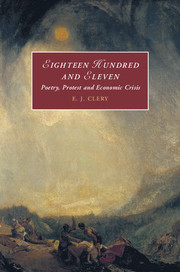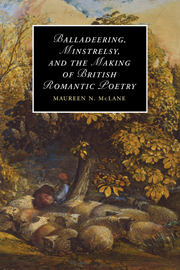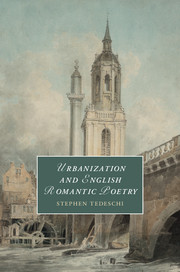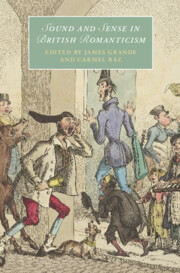Eighteen Hundred and Eleven
Poetry, Protest and Economic Crisis
£91.99
Part of Cambridge Studies in Romanticism
- Author: E. J. Clery, University of Southampton
- Date Published: June 2017
- availability: Available
- format: Hardback
- isbn: 9781107189225
£
91.99
Hardback
Other available formats:
Paperback, eBook
Looking for an inspection copy?
This title is not currently available on inspection
-
In 1811 England was on the brink of economic collapse and revolution. The veteran poet and campaigner Anna Letitia Barbauld published a prophecy of the British nation reduced to ruins by its refusal to end the interminable war with France, titled Eighteen Hundred and Eleven. Combining ground-breaking historical research with incisive textual analysis, this new study dispels the myth surrounding the hostile reception of the poem and takes a striking episode in Romantic-era culture as the basis for exploring poetry as a medium of political protest. Clery examines the issues at stake, from the nature of patriotism to the threat to public credit, and throws new light on the views and activities of a wide range of writers, including radical, loyalist and dissenting journalists, Coleridge, Wordsworth, Southey, and Barbauld herself. Putting a woman writer at the centre of the enquiry opens up a revised perspective on the politics of Romanticism.
Read more- Provides new insights into the economic crisis of 1811 by placing a woman writer at the centre of enquiry into literature and politics
- Addresses the current interest in the culture of dissent in the eighteenth and nineteenth centuries
- Gives a wide-ranging account of the political, cultural and economic contexts of the period
Awards
- Winner, 2018 Rose Mary Crawshay Prize, British Academy
Reviews & endorsements
'Clery's subject is Anna Letitia Barbauld's poem 'Eighteen Hundred and Eleven', published in February 1812 as an attack on the British government's policies, particularly, according to Clery, the Orders in Council of 1807 limiting trade. … Recommended. Upper-division undergraduates through faculty.' J. Rosenblum, Choice
See more reviews'E. J. Clery aims definitively to put to rest the myth about Barbauld's sensitivity to criticism; to rehabilitate her image; and to offer a new interpretation of the poem as a response to specific economic problems and part of a successful effort to force the government to address them … this illuminating case study is able to give a detailed account of the year 1811 as well as of its namesake poem.' H. J. Jackson, The Times Literary Supplement
'The book is a game-changer not only in its account of the strategies and distinctiveness of Barbauld's poem but also in painstakingly elucidating how a poem actually changes political-cultural realities … It will appeal to scholars interested in Barbauld and/or women writers; in the Dissenting community and, especially the Aikin-Barbauld circle; in connections between economic and poetic debates and practices in the Romantic era; in the literary-political culture of Britain from 1808–12, including the impact of periodical reviews … Clery's Eighteen Hundred and Eleven is a bold book that is true to the spirit of Barbauld's poem in not only showing how but also believing that a literary work engages times of crisis with an efficacy that acknowledges the power of public fantasies and reasoned debate in shaping daily reality.' Julie Carlson, University of California, Santa Barbara
'E. J. Clery's passionate and well-researched study on Eighteen Hundred and Eleven is the work that Anna Barbauld's long neglected 334-line poem deserves … Clery writes with conviction and verve; this is a work whose tone is con brio tracing the contexts of politics and economy in the years surrounding the writing of the poem, but its aims are more wide-ranging than this ambitious re-evaluation of one work might suggest. Clery makes a case for rereading women Romantic poets' work as something other than 'narratives of defeat and disappointment, compromise and constraint' as well as recognizing that they wrote in 'collaboration and dialogue' with men … E. J. Clery's excellent book is highly recommended.' Lisa Vargo, The BARS Review
'It is written like a detective novel, and certainly has the pace of one … a quiet triumph of staging and presentation, and deeply original not only for its specific argument, but in its narrative method … A model of how transformational a feminist resistance to the commonplaces of 'women's history' (the usual narrative of silencing) can be.' The Rose Mary Crawshay Prize Committee
'… articulated with sharply relevant and illuminating specificity - and, above all, with an enlivening commitment to Barbauld's courage and distinction in summoning her readers to join the opposition against catastrophic imperialist war.' William Keach, The Wordsworth Circle
'E. J. Clery has presented what will long stand as the definitive reading of the significance of the poem Eighteen Hundred and Eleven, a revisionist reading that calls conventional assumptions, beliefs, and interpretations into question.' Elizabeth Kraft, European Romantic Review
'… Clery produces masterful scholarship, artistically crafted. This immensely satisfying book is a model of superb research and the most illuminating rendering to date of the poem and its significance.' Scott Krawczyk, Keats-Shelley Journal
Customer reviews
Not yet reviewed
Be the first to review
Review was not posted due to profanity
×Product details
- Date Published: June 2017
- format: Hardback
- isbn: 9781107189225
- length: 326 pages
- dimensions: 235 x 160 x 22 mm
- weight: 0.61kg
- availability: Available
Table of Contents
Introduction: the puzzle and the myth
Part I. The Making of Eighteen Hundred and Eleven:
1. Economic warfare
2. Writing for the enemy
3. Commercial dissent
4. Stoic patriotism
5. The prophet motive
6. Ruin: doing the policy in different voices
7. Lady credit
Part II. What Happened Next:
8. Publication to vindication: a chronology
9. The summer of 1812 and after
Conclusion.
Sorry, this resource is locked
Please register or sign in to request access. If you are having problems accessing these resources please email [email protected]
Register Sign in» Proceed
You are now leaving the Cambridge University Press website. Your eBook purchase and download will be completed by our partner www.ebooks.com. Please see the permission section of the www.ebooks.com catalogue page for details of the print & copy limits on our eBooks.
Continue ×Are you sure you want to delete your account?
This cannot be undone.
Thank you for your feedback which will help us improve our service.
If you requested a response, we will make sure to get back to you shortly.
×






